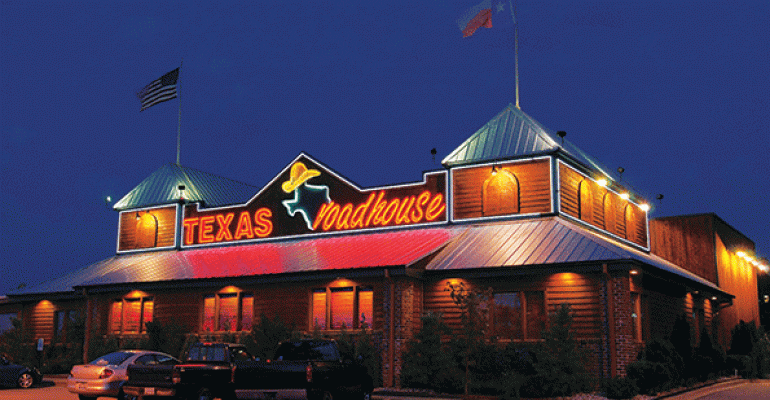Rising sales and lower food costs conspired to give Texas Roadhouse Inc. strong earnings in the second quarter, the company said this week, but concerns about slowing sales have hit its stock price.
The Louisville-based company’s stock price fell nearly 12 percent on Tuesday, after it missed revenue projections and said same-store sales so far in the third quarter are slower than they’d been earlier in the year.
Same-store sales rose 4.5 percent in the quarter ended June 28. But those sales seemed to slow to 3.7 percent in July, and at least part of those sales were due to July 4 landing on a Monday, rather than a Saturday like last year.
“July is definitely lower for us, from what we’ve been experiencing,” Scott Colosi, the company’s president and chief financial officer, said on an earnings call Tuesday. “We don’t have the answer. We can only speculate. I can tell you in our case we’re not operating any differently. We’ve got the same labor staffing, the same food quality. We’ve got the same aggressive price points.
“We are still growing traffic, but I think anything about why as an industry, or anybody specifically, why sales might be tailing off, I think, is speculation.”
Kent Taylor, the company’s CEO, suggested the company “is just rolling over some strong” same-store sales. He said that same-store sales rose 12.6 percent in the second quarter on a two-year basis, and in the first quarter the two-year number was 13.5 percent.
Still, food costs have been falling. Lower protein costs led to commodity deflation of 6.8 percent.
That led to some strong profit growth. Net income increased 59 percent to $33.6 million, or 47 cents per share, from $21.1 million, or 30 cents.
And executives expect these lower commodity costs to continue. “We expect to experience continued food cost deflation again next year,” Taylor said.
But he also said the company expects labor cost inflation at the same time, which has been offsetting lower commodity costs. Wage rates increased 3.5 percent in the quarter, and the company said that turnover also increased.
Colosi said that hourly turnover is 120 percent, which is something “we’re absolutely not happy with, and that’s quite a bit higher, 20 percent higher, than we were three or four years ago.”
“We can make all sorts of excuses, the tightening labor market, lower unemployment, so forth and so on, but at the end of the day, it’s just unacceptable and we are definitely talking about it.”
Still, Colosi said, the timing of the lower food costs have been “fortuitous” given higher wage rates and oncoming overtime regulations that will increase the number of workers eligible for overtime.
“Given where the labor markets are today, with normal wage inflation plus the [Department of Labor regulations], it’s pretty fortuitous, I think, for us at this point in time.”
The company has 403 company-owned Texas Roadhouse locations while franchisees operate another 84 units. Texas Roadhouse plans to open 30 company-owned restaurants this year, eight of which are its new Bubba’s 33 concept. Bubba’s currently has 11 locations open.
Texas Roadhouse is testing its mobile app in the Houston market. The app enables consumers to get on the wait list, pay at the table or make to-go orders. Colosi said the company is “encouraged by the positive feedback” and expects the app to make its way into additional markets by the end of the year.
“I think getting on our wait list and to-go ordering is really going to help,” Taylor said. “And pay-at-the-table, I will tell you everybody that’s invested in those kiosks on the table will probably be throwing those away the next two years, because I think everybody’s going to switch to phone applications.”
Texas Roadhouse stock had been among the strongest restaurant companies on Wall Street going into the day — it had been up 35 percent on the year as of close on Tuesday. Even after today’s decline, it’s still up more than 19 percent.
Contact Jonathan Maze at [email protected]
Follow him on Twitter: @jonathanmaze





